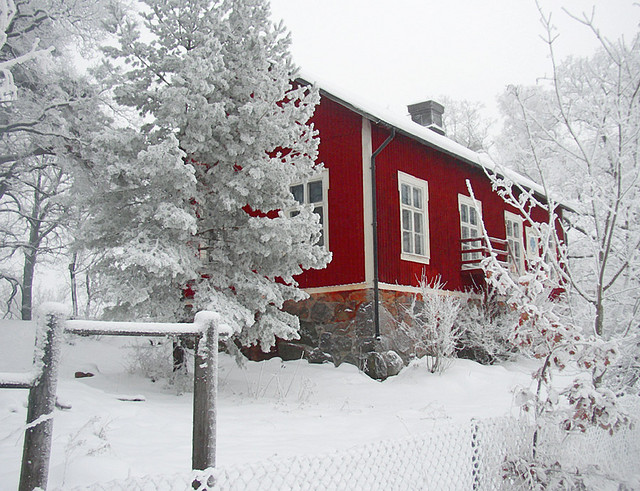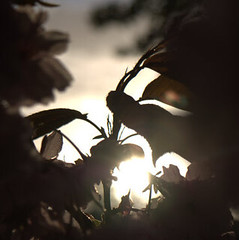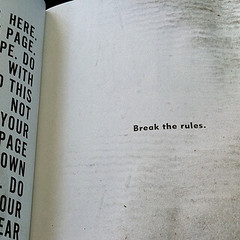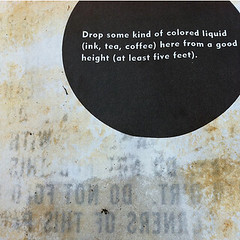The best in poetry (and poetic things), this week with Seth Haines.
1 Art
A few months back, we highlighted the story of Cecilia Gimenez, the retired amateur artist who voluntarily (and without permission) transformed the famous portrait of Christ, the “Ecce Homo, ” into something straight out of an X-Files Episode. Turns out, Gimenez didn’t stop painting after the blunder that shook up the art world. Instead, she crafted an original work that will soon be the property of one lucky Ebay bidder.
And here’s the shocking part—it’s not terrible.
Want more details on how to get you hands on Gimenez’s work? Read the article by Lauren Frayer at the NPR for more details on how to bid on this piece of art history.
2 News
What do you get when place a xenophobic editor on the staff of the Oxford English Dictionary? Evidently, an abridged dictionary!
This week it was revealed that a former editor at the OED deleted thousands of words with foreign origins. What’s more, he blamed previous editors for the deletions of “loanwords”—words with foreign roots. Deleted words include “balisaur” and “boviander.” You can read more about this debacle in the fascinating article published by the Guaradian, or you can check out Sarah Ogilvie’s book, Words of the World: A Global History of the Oxford English Dictionary, which explores the issue further.
3 Publishing
At Tweetspeak, we talk a great deal about the changing face of publishing and how the proliferation of electronic devices has turned the industry on its ear. Want more proof? Take a gander at The Silent History, the “serialized, exploratory novel for iPhone & iPad.” As marketed, The Silent History is told through a series of daily app updates, and allows readers to explore the world of the novel through additional location-based stories.
Wired calls the novel “entirely revolutionary.” Intriguing, right?
Dickens, move over! The serial novel has a new (inter)face!
4 Poetry at Work
Lately, we’ve been exploring the topic of Poetry at Work here at Tweetspeak. And there’s good reason. Poetry teaches us to make an “intuitive leap, creating meaning where it didn’t exist before, ” and then helps us communicate the meaning to our audience.
Don’t just take my word for it, though. Check out this spoken word piece by professional soccer player Daniel Sturridge in which he speaks of his work. It’s a beautiful video and amazing poem, even if you’re not a fan of the sport.
5 Creativity
At the tail-end of my graduate school experience, I found my capacity for mental exercise waning. Suffering from intellectual fatigue, my academic and creative faculties were dangerously depleted. My father, wise man that he is, recommended that I take up a new hobby—fly fishing. I agreed, and two weeks later, we stood on the banks of the White River, flies dead-drifting into the mouths of unsuspecting rainbow trout.
I’ll never forget the first time I saw the flash of the trout belly against the midday sun, or the way the bald eagles patrolled the river for cast-away fish. On these banks I realized that in order to survive the linear world of my chosen profession, I would need two things—a creative outlet, and nature.
And it’s not just me. Read this article at the Los Angeles Times, which discusses the recent finding that communing with nature increases cognitive function, especially if one’s cognitive reserves are zapped. And after you read it, ask yourself, when’s the last time you stepped into nature? When’s the last time you walked a wilderness trail? Perhaps it’s time you get away from the desk and get out into the fresh air? I think you’ll find it will help your creative juices flow.
6 Write-It
What is a random act of poetry? Ask Dylan Barmmer who has committed over 3, 000 random acts of poetry over the last few years. Barmmer passes out original poetry to passers-by at places like the local train station. In this article for the Del Mar Times, he speaks about how the practice has caused him to be more creative, caused him to interact and connect with others in different ways.
And speaking of Random Acts of Poetry, have you checked out Tweetspeak’s post category on the topic? There are some great posts neatly tucked away there, and you might find a bit of inspiration. So, what are you waiting for? Get to writing, and commit your own random act of poetry!
7 Poems
This holiday season, we’re exploring haiku poetry at Tweetspeak. I know, the ancient form of Japanese poetry and plump visions of Saint Nick don’t exactly go hand-in-hand, but it’s just these kind of juxtapositions that help us keep things fresh around here.
Consider our own Glynn Young’s poem, All I Want for Christmas is a Real Haiku, in which he builds a sort of compound haiku. He writes:
Air rifles in hand,
two boys stalk the woods seeking
unsuspecting bird.
Christmas hopes destroyed:
teacher says Santa is not.
Puppy restores faith.
Would you consider joining Glynn and the rest of us at Tweetspeak in writing your own holiday haiku? Share it with us, and we’ll tweet it to the world!
8 People
In the mid-80s, my uncle was the coolest, permed mullet-wearing fraternity boy I knew. I wanted to be just like him, wanted to dress like him, walk like him, and listen to the same music. And when we spent time together, only one band’s records graced his turntable—the inimitable Rush.
Rush’s lyrics are intense and use wonderful rhyme schemes and word plays. What’s more, their poetry says something. And their drummer, Neil Peart, is widely regarded as one of the best to ever pick up sticks. This week, the good people at the Rock-and-Roll Hall of Fame have announced that Rush will be inducted into its ranks (along with the rap crew Public Enemy and others). Congratulations to Rush; here’s to Tom Sawyer!
9 Books
Ever wonder what it would have been like to be classmates with Sylvia Plath and Anne Sexton in a poetry class taught by Robert Lowell? Get a glimpse in this review of Kathleen Spivack’s memoir, With Robert Lowell and His Circle. Read about Lowell’s penchant for mentoring the prettiest girls, Plath’s astonishing stillness, and Sexton’s feminine retreat.
If you are a lover of poetry, this review is a must-read. And once you read the review, I guarantee you’ll find Spivack’s memoir on your Amazon wish list!
10 Sound n Motion
What inspires the creative notion? That’s a complex philosophical question that will likely never be fully answered here at Tweetspeak. However, The Oxford American might might help you answer a simpler question—what inspires one to create the world’s largest tree house? Enjoy.
Cover photo by Per Ola Wiberg. Creative Commons license via Flickr. Article photos by Claire Burge. Used with permission. Post by Seth Haines.
__________________
Buy a year of Every Day Poems, just $2.99— Read a poem a day, become a better writer. In December we’re exploring the theme Haiku.
- Become a Better Writer: Fly Fishing Artist Date - June 6, 2014
- No Cat Poetry for Fierce Dog Lovers - November 22, 2013
- Exploring Poetry: Penning a Ghazal - October 18, 2013












Maureen Doallas says
Love the video, Seth. Fascinating that someone would spend almost two decades building what cannot be used. (Taschen has just published a book about lux treehouses that would make for some high-end writers’ shacks.)
Everyone should commit a random act of poetry.
Lexanne Leonard says
Thank you, again, for making Thursday my favorite day of the week.